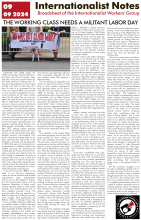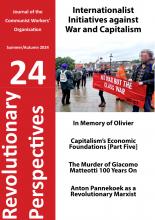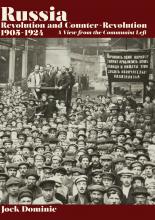Written by Jock Dominie. £12, 276pp.
The Russian Revolution remains a landmark event in history. For the bourgeois historians, the October Revolution is thought to be a tragedy that set back the achievements of the “democratic” February Revolution, and allowed the Bolsheviks to wreak havoc on their citizens and the world. For the Stalinists, the events of 1917 paved the way for the birth of the USSR, which they point to as a prototypical example of “socialism in one country”. In reality, the February and October Revolutions were both part of the same proletarian revolution.
The book can be ordered by emailing us at uk@leftcom.org and asking for our banking details, or by donating the cost of the publications required via Paypal using the “Donate” button. Postage charges should be added. If in the UK, and paying direct to our bank account, first class postage is free. If via Paypal add £2. For Europe cost of a copy with postage is €20 (EUR), for Australia it is $42 (AUD) and for the USA and anywhere else in the world it is $27 (USD).











There is a logical flaw to
There is a logical flaw to your argument, Who apart from incorrigible intellectuals and trainspotters has today heard of Turati? Why therefore engage with it? Let the social democrats argue for him and we might have to argue against him.
Like I quote Bordiga in my
Like I quote Bordiga in my linked thread, Turati is considered among the calibre of a Jaures and a Bebel (or I would add, a Keir Hardie, an Emile Vandervelde, or a Morris Hillquit). So as is typical, there's a research foundation named after him: fondazionestudistoriciturati.it
The social democrats don't need to "argue for him", or for any of these figures, which are historical founders: probably every school child in a boring history lesson at school has once run across them.
They don't need to argue for Turati and justify parliamentarism, because they face no leftcom challenge, unlike Turati at the time of the rise of the early communists (with Bordiga).
They also don't study their own history, because they're opportunists who have no interest in "intellectual" stuff like historical memory. If there's a few social-democratic intellectuals who praise Turati, or even if there was a whole academic industry promoting Turati (which would perhaps be an improvement over Gramsci), then you could still argue that it would not be a political priority to oppose them; after all, their journals are behind paywalls, their conferences demand large fees, and their books are too expensive to buy for an ordinary worker.
Bordiga and the early communists didn't need to remind their audience who Turati was. Turati was who they opposed and defined themselves against. Just like Lenin didn't need to remind workers in Germany (or even world-wide) who Kautsky was. The ICT acknowledged the importance of debate topics such as parliamentarism, for example when it debated with the SPGB (even though SPGB is a tiny organisation). I would say the ICT, as defender of Italian leftcom tradition, has a special responsibility here.
Have the CWO already seen
Have the CWO already seen this recent piece by Martin Thomas on the AWL's site: workersliberty.org
As its title suggests, it's just a historical survey of 'left communism', not really a polemic, so there is perhaps no need for a response by the CWO. I can't find much arguments in it, besides the usual, ie that left communist groups are tiny sects who live in a "bunker" awaiting the glorious day.
However, I think this example of 'engagement' proves my point, namely that we can't expect political activists that are part of, or work in, the Labour Party (or social democratic parties) to defend their stance (on electoral participation) in a serious theoretical way. They don't feel the need for it. They can even comfortably discuss the history of left communism (Bordiga etc.) in a detached manner. Therefore, like I said, I think it is necessary to take the offensive, not against some particular person today (such as Martin Thomas), however smart they may be, but against the highest proponents of parliamentarism, historically, such as Turati. And that's where the CWO (or its Italian partner) have a particular responsibility.